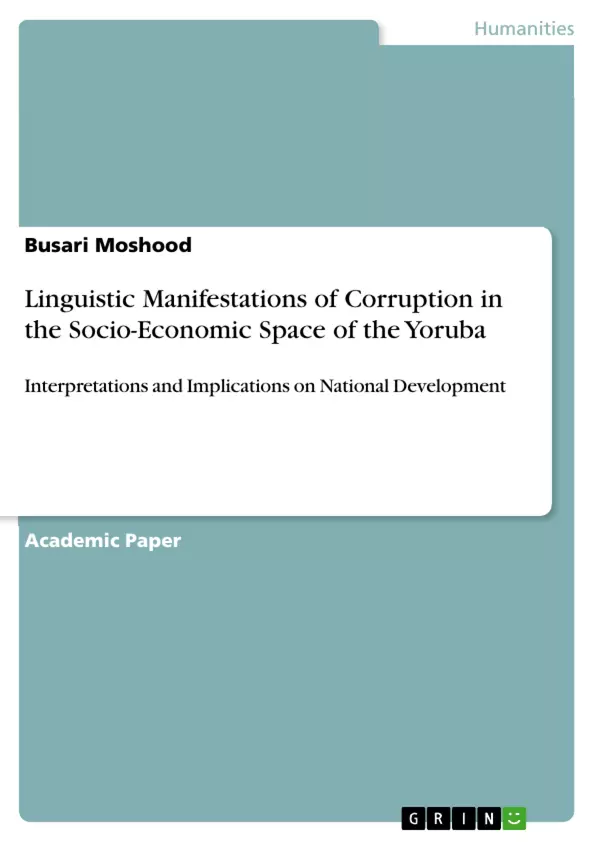Corruption is a global phenomenon that has established itself as a cankerworm in the socio-economic sphere of the modern society. Inordinate quest for worldly materials and the urge to becoming rich and wealthy by all means give rise to various social ills and evils which can be said to have formed types and categories of corruption. Much has been conceptualised and philosophised about the word corruption without critically looking at the seemingly cultural approval and encouragement of corrupt practices in the modern social system, especially of the Yoruba.
Therefore, this paper examined some Yoruba expressions which seem to have tacitly made inferences to corruption as if it is a culturally approved and legalised practice. Such linguistic and semantic inferences which portray the preference for wealth and riches with little or no respect for dignity of labour and the virtue of hard work and industriousness by the Yoruba were espoused. This was done using Linguist Cultural Theory of Corruption (LCTC) which was specifically designed for the interpretation of a score of expressions of the Yoruba examined in this paper. By this theory, the unconscious role played in the enthronement of corruption, by the use of language in various cultures was established, using the rich Yoruba linguistic heritage as reference point. This was argued to have strongly aided the fast spread of corruption and its resultant effects on national development. The paper concluded with a proposal of using the same linguistic framework to engender a re-awakening of dead moral values in our society and to ensure sustainable national development.
Inhaltsverzeichnis (Table of Contents)
- Introduction
- Corruption: Definition, Causes and Types
- Theories of Corruption
- The Yoruba Language and Its Speakers in Brief
Zielsetzung und Themenschwerpunkte (Objectives and Key Themes)
This paper examines the manifestation of corruption in Yoruba culture through linguistic analysis. It aims to shed light on the role of language in shaping and perpetuating corrupt practices within the socio-economic space of the Yoruba, ultimately exploring its implications on national development.
- The definition and various types of corruption
- The relationship between language and corruption
- The influence of Yoruba language and culture on corrupt practices
- The impact of corruption on national development
- Strategies for addressing and mitigating corruption through linguistic interventions
Zusammenfassung der Kapitel (Chapter Summaries)
- Introduction: This section sets the stage for the paper by defining corruption, exploring its diverse manifestations, and outlining the central focus on the role of language in perpetuating corrupt practices within the Yoruba socio-economic space.
- Corruption: Definition, Causes and Types: This chapter delves into the multifaceted nature of corruption, exploring its various definitions, causes, and types. It highlights the impact of corruption on the moral fabric of society and its detrimental effects on national development.
- Theories of Corruption: This section examines existing theories of corruption, including the modernization theory, historical and cultural theory of corruption. It provides insights into the factors contributing to corruption in different societies.
- The Yoruba Language and Its Speakers in Brief: This chapter presents an overview of the Yoruba language, its speakers, and its cultural significance. It discusses key features of the language and its influence on societal norms and practices.
Schlüsselwörter (Keywords)
This paper delves into the nexus between language and corruption, focusing on the Yoruba language and its speakers as a case study. It explores the impact of corruption on national development and examines strategies for mitigating its effects through linguistic interventions. Key terms and concepts include corruption, Yoruba language and culture, social ills, national development, linguistic-cultural theory, and cultural approval of corrupt practices.
Frequently Asked Questions
What is the focus of the Linguistic Cultural Theory of Corruption (LCTC)?
LCTC is designed to interpret how language use in various cultures, specifically the Yoruba, can unconsciously role-play in the enthronement and approval of corrupt practices.
How does the Yoruba language relate to corrupt practices?
The paper examines specific Yoruba expressions that seem to provide tacit cultural approval for wealth acquisition regardless of the means, undermining the dignity of labor.
What are the main causes of corruption mentioned in the paper?
An inordinate quest for worldly materials and the urge to become wealthy by all means are cited as primary drivers for social ills and corruption.
What impact does linguistic approval of corruption have on national development?
It aids the fast spread of corrupt practices, which in turn hinders sustainable national development and erodes moral values.
Can language be used to fight corruption according to the author?
Yes, the paper proposes using the same linguistic framework to re-awaken dead moral values and promote integrity for sustainable development.
- Quote paper
- Busari Moshood (Author), 2022, Linguistic Manifestations of Corruption in the Socio-Economic Space of the Yoruba, Munich, GRIN Verlag, https://www.grin.com/document/1183757



